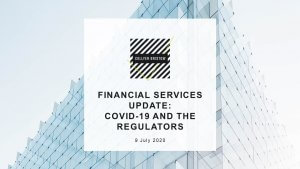- Banking & financial disputes
- Financial services

Longer Reads
Court of Appeal confirms bank’s wide discretion in determining “fair market value” for ‘repo’ trades under Global Master Repurchase Agreement
In its recent decision in LBI EHF v Raiffeisen Bank International AG[2018] EWCA Civ 719, the Court of Appeal confirmed the wide discretion enjoyed by a non-defaulting party under the default valuation provisions in the Global Master Repurchase Agreement (2000 edition) (“GMRA”) when it comes to determining the “fair market value” of securities.
2 minute read
Published 22 January 2019
Key information
In particular, when assessing “fair market value”, the non-defaulting party is entitled to have regard to any distressed or illiquid market conditions that were being experienced at the relevant time.
Background
Landsbanki Islands (“LBI”), an Icelandic bank, had entered into a number of “repo” trades with Raiffeisen Bank International (“Raiffeisen”), a Romanian bank. Under the repo trades, LBI sold a portfolio of bonds to Raiffeisen, agreeing to repurchase them at a predetermined price at a later date. Repo trades function as a form of secured lending, with the bonds acting as the security, and the agreed repurchase price including an amount by way of interest. As is common within the repo market, the trades were governed by the GMRA.
On 7 October 2008, as financial markets were still suffering from the fallout of the Lehman Brothers bankruptcy, LBI failed and went into receivership. This constituted an event of default under paragraph 10 of the GMRA, and Raiffeisen served default notices on LBI the next day.
“Fair market value” under the GMRA
Once the default notices had been served, the GMRA provided that LBI had to pay Raiffeisen the agreed repurchase price, less the “Default Market Value of Equivalent Securities”.
So how is the “Default Market Value of Equivalent Securities” to be determined? In the circumstances of this case, the applicable GMRA provision was paragraph 10(e)(ii), which provides that it shall be “an amount equal to their Net Value at the Default Valuation Time” (in this case, 15 October 2008).
“Net Value” is then defined as “the amount which, in the reasonable opinion of the non-Defaulting Party, represents their fair market value, having regard to such pricing sources and methods….as the non-Defaulting Party considers appropriate”. The key phrase “fair market value” is not defined.
On the face of it, therefore, this provision confers a wide discretion on Raiffeisen to determine “fair market value” in the manner of its choosing.
Raiffeisen wished to use, as the basis of its valuation, market quotations obtained for equivalent securities at the default valuation time, when the repo market was still experiencing distressed conditions following the Lehman Brothers collapse.
The parties’ arguments
LBI argued before the High Court that, despite the broad contractual wording in the GMRA, Raiffeisen’s discretion to determine fair market value should be limited in a number of ways.
The High Court ruled against LBI. On appeal to the Court of Appeal, LBI’s central remaining argument was that the phrase “fair market value” implied that there must be “a willing buyer, willing seller, knowledge of the asset in question and a lack of compulsion”. This meant that Raiffeisen was not permitted to have regard to quotations obtained for equivalent securities whilst the market was experiencing distressed or illiquid conditions. This method would produce an unduly low value, and would amount to simply determining “market value”, rather than “fair market value” as required by the GMRA.
In support of this argument, LBI referred to a number of Commonwealth authorities on the meaning of “fair market value” in other agreements, which supported the notion that the word “fair” meant that the market price used in a valuation must have some “element of consistency which precludes the existence of a transient boom or sudden panic”, and must be “realistic rather than ephemeral”.
Raiffeisen countered that, in contrast to the context of the Commonwealth authorities, the discretion conferred by the GMRA expressly extended to the “pricing sources and methods” used in the valuation. To impute a prohibition against using quotations obtained during distressed or illiquid market conditions would place a significant restriction on this discretion, and one that was fundamentally inconsistent with the language of the GMRA provision.
The Court of Appeal’s decision
The Court of Appeal ruled in favour of Raiffeisen. The restriction on Raiffeisen’s discretion sought by LBI does not appear within the express terms of the GMRA, nor is there any basis for its implication. Its implication would be contrary to the express language of the provision, in particular, the wide discretion conferred on Raiffeisen over the “pricing sources and methods”.
The only implied restriction on Raiffeisen’s discretion is therefore the usual restriction on contractual discretions recognised by Rix LJ in Socimer Bank v Standard Bank [2008] Civ 116, being that the decision-maker must act rationally, and not arbitrarily or perversely.
The Court of Appeal conceded that this meant that the word ““fair” has little to add to “market value””, but was content for the word to merely emphasise the “need for fairness in the sense of rationality”.
The Court of Appeal declined to provide any further definition for the phrase “fair market value” in the GMRA. It noted that “the GMRA is used in respect of a wide variety of financial instruments”, meaning that there was a danger that providing a definition which worked in the context of repo trades might inadvertently hinder the phrase’s utility in other contexts.
Implications
The GMRA is very commonly used within financial markets. This decision therefore provides some welcome further clarity on the scope of the non-defaulting party’s discretion when determining “fair market value” under the GMRA’s default valuation provisions.
Related content
Longer Reads
Court of Appeal confirms bank’s wide discretion in determining “fair market value” for ‘repo’ trades under Global Master Repurchase Agreement
In its recent decision in LBI EHF v Raiffeisen Bank International AG[2018] EWCA Civ 719, the Court of Appeal confirmed the wide discretion enjoyed by a non-defaulting party under the default valuation provisions in the Global Master Repurchase Agreement (2000 edition) (“GMRA”) when it comes to determining the “fair market value” of securities.
Published 22 January 2019
Associated sectors / services
Authors
In particular, when assessing “fair market value”, the non-defaulting party is entitled to have regard to any distressed or illiquid market conditions that were being experienced at the relevant time.
Background
Landsbanki Islands (“LBI”), an Icelandic bank, had entered into a number of “repo” trades with Raiffeisen Bank International (“Raiffeisen”), a Romanian bank. Under the repo trades, LBI sold a portfolio of bonds to Raiffeisen, agreeing to repurchase them at a predetermined price at a later date. Repo trades function as a form of secured lending, with the bonds acting as the security, and the agreed repurchase price including an amount by way of interest. As is common within the repo market, the trades were governed by the GMRA.
On 7 October 2008, as financial markets were still suffering from the fallout of the Lehman Brothers bankruptcy, LBI failed and went into receivership. This constituted an event of default under paragraph 10 of the GMRA, and Raiffeisen served default notices on LBI the next day.
“Fair market value” under the GMRA
Once the default notices had been served, the GMRA provided that LBI had to pay Raiffeisen the agreed repurchase price, less the “Default Market Value of Equivalent Securities”.
So how is the “Default Market Value of Equivalent Securities” to be determined? In the circumstances of this case, the applicable GMRA provision was paragraph 10(e)(ii), which provides that it shall be “an amount equal to their Net Value at the Default Valuation Time” (in this case, 15 October 2008).
“Net Value” is then defined as “the amount which, in the reasonable opinion of the non-Defaulting Party, represents their fair market value, having regard to such pricing sources and methods….as the non-Defaulting Party considers appropriate”. The key phrase “fair market value” is not defined.
On the face of it, therefore, this provision confers a wide discretion on Raiffeisen to determine “fair market value” in the manner of its choosing.
Raiffeisen wished to use, as the basis of its valuation, market quotations obtained for equivalent securities at the default valuation time, when the repo market was still experiencing distressed conditions following the Lehman Brothers collapse.
The parties’ arguments
LBI argued before the High Court that, despite the broad contractual wording in the GMRA, Raiffeisen’s discretion to determine fair market value should be limited in a number of ways.
The High Court ruled against LBI. On appeal to the Court of Appeal, LBI’s central remaining argument was that the phrase “fair market value” implied that there must be “a willing buyer, willing seller, knowledge of the asset in question and a lack of compulsion”. This meant that Raiffeisen was not permitted to have regard to quotations obtained for equivalent securities whilst the market was experiencing distressed or illiquid conditions. This method would produce an unduly low value, and would amount to simply determining “market value”, rather than “fair market value” as required by the GMRA.
In support of this argument, LBI referred to a number of Commonwealth authorities on the meaning of “fair market value” in other agreements, which supported the notion that the word “fair” meant that the market price used in a valuation must have some “element of consistency which precludes the existence of a transient boom or sudden panic”, and must be “realistic rather than ephemeral”.
Raiffeisen countered that, in contrast to the context of the Commonwealth authorities, the discretion conferred by the GMRA expressly extended to the “pricing sources and methods” used in the valuation. To impute a prohibition against using quotations obtained during distressed or illiquid market conditions would place a significant restriction on this discretion, and one that was fundamentally inconsistent with the language of the GMRA provision.
The Court of Appeal’s decision
The Court of Appeal ruled in favour of Raiffeisen. The restriction on Raiffeisen’s discretion sought by LBI does not appear within the express terms of the GMRA, nor is there any basis for its implication. Its implication would be contrary to the express language of the provision, in particular, the wide discretion conferred on Raiffeisen over the “pricing sources and methods”.
The only implied restriction on Raiffeisen’s discretion is therefore the usual restriction on contractual discretions recognised by Rix LJ in Socimer Bank v Standard Bank [2008] Civ 116, being that the decision-maker must act rationally, and not arbitrarily or perversely.
The Court of Appeal conceded that this meant that the word ““fair” has little to add to “market value””, but was content for the word to merely emphasise the “need for fairness in the sense of rationality”.
The Court of Appeal declined to provide any further definition for the phrase “fair market value” in the GMRA. It noted that “the GMRA is used in respect of a wide variety of financial instruments”, meaning that there was a danger that providing a definition which worked in the context of repo trades might inadvertently hinder the phrase’s utility in other contexts.
Implications
The GMRA is very commonly used within financial markets. This decision therefore provides some welcome further clarity on the scope of the non-defaulting party’s discretion when determining “fair market value” under the GMRA’s default valuation provisions.
Associated sectors / services
- Banking & financial disputes
- Financial services
Authors
Need some more information? Make an enquiry below.
Subscribe
Please add your details and your areas of interest below
Article contributor
Robin
HenryPartner - Head of Dispute Resolution Services
Specialising in Banking & financial disputes, Commercial disputes, Corporate recovery, restructuring & insolvency, Financial regulatory and Personal insolvency
Enjoy reading our articles? why not subscribe to notifications so you’ll never miss one?
Subscribe to our articlesMessage us on WhatsApp (calling not available)
Please note that Collyer Bristow provides this service during office hours for general information and enquiries only and that no legal or other professional advice will be provided over the WhatsApp platform. Please also note that if you choose to use this platform your personal data is likely to be processed outside the UK and EEA, including in the US. Appropriate legal or other professional opinion should be taken before taking or omitting to take any action in respect of any specific problem. Collyer Bristow LLP accepts no liability for any loss or damage which may arise from reliance on information provided. All information will be deleted immediately upon completion of a conversation.
Close









































































